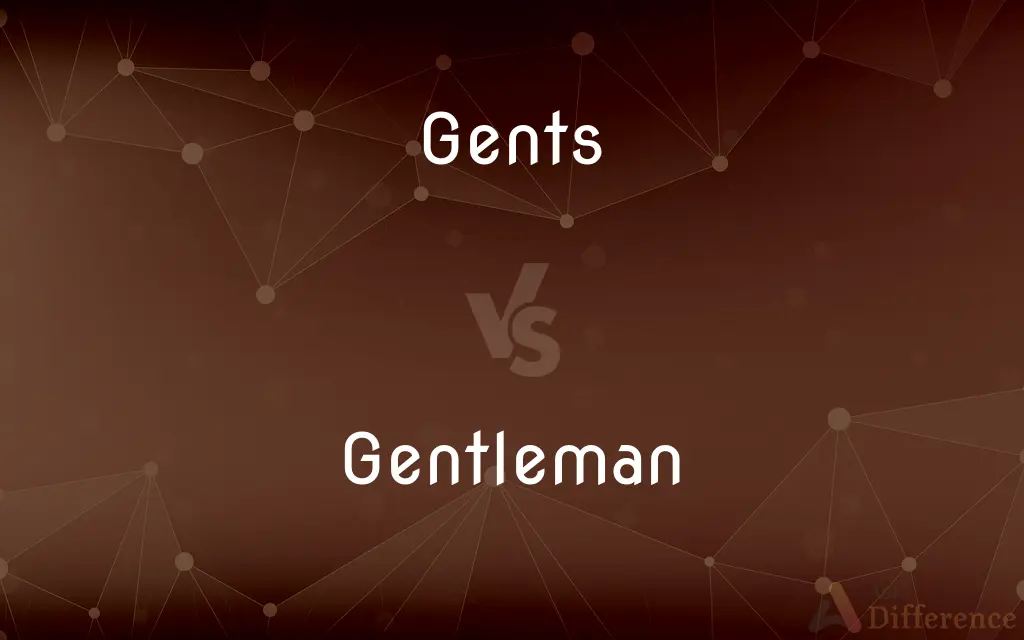Gents vs. Gentleman — What's the Difference?
Edited by Tayyaba Rehman — By Urooj Arif — Updated on June 14, 2024
"Gents" refers to men collectively, often in informal contexts, whereas "gentleman" denotes a man with courteous, polite behavior and noble qualities.

Difference Between Gents and Gentleman
Table of Contents
ADVERTISEMENT
Key Differences
"Gents" is a casual abbreviation of "gentlemen" used to refer to young males in a general sense, without implying anything about their behavior or character. It's often seen in signs for restrooms or in casual speech. A "gentleman," however, carries a connotation of refinement and respectability, referring to a man who is distinguished by his courteous, considerate behavior, and sometimes by his social position or birth. Historically, the term was associated with men of high social rank, but it has evolved to emphasize conduct over class.
While "gents" can be used to address or describe a group of men in casual or informal settings, "gentleman" implies a standard of behavior that includes politeness, respect for others, and a sense of honor. This distinction is not merely about social standing but about the qualities that define a man's character and his interactions with others.
The use of "gentleman" in everyday language often serves to highlight an individual's gracious and thoughtful behavior, whether in personal relationships, business dealings, or public life. It suggests a level of respect and consideration for others that goes beyond basic civility. On the other hand, "gents" is more neutral and can be used in a wide range of contexts without implying a judgment about the individuals' character.
In modern usage, the term "gentleman" has become less about societal status and more about describing a man's demeanor and actions towards others. It encompasses a broad set of virtues, including honesty, integrity, and respect. In contrast, "gents" remains a colloquial term, useful for its brevity and lack of pretension, but without the deeper implications of personal conduct and moral quality that "gentleman" conveys.
Despite their differences, both terms reflect aspects of how men are viewed and referred to in society, with "gents" serving a more utilitarian and inclusive role, and "gentleman" invoking an ideal of behavior and character that transcends mere gender or age.
ADVERTISEMENT
Comparison Chart
Meaning
Informal term for men collectively
Refers to a man of courteous conduct and noble qualities
Usage Context
Casual, often seen in signage
Used to denote behavior and character
Implications
Neutral, without connotations of behavior
Implies politeness, respect, and moral integrity
Historical Association
None
Originally linked to men of high social rank, now more about behavior
Modern Connotation
Broad, generic reference to young males
Emphasizes personal qualities over social status
Compare with Definitions
Gents
Collective Reference.
The gents at the club decided to go for a night out.
Gentleman
Noble Qualities.
His honesty and integrity make him a gentleman in the truest sense.
Gents
Neutral Term.
We have a special offer for all gents visiting our store today.
Gentleman
Respectable Conduct.
A gentleman always respects the opinions of others, even when disagreeing.
Gents
Casual Use.
This way to the gents' room.
Gentleman
Modern Character Ideal.
Despite his humble origins, his conduct is that of a gentleman.
Gents
Signage and Directions.
Gents to the left, ladies to the right.
Gentleman
Polite Behavior.
He always opens doors for others, a true gentleman.
Gents
Informal Address.
Alright, gents, let's get started with the meeting.
Gentleman
Historical Social Status.
In the 19th century, being a gentleman often meant belonging to the upper classes.
Gents
A gentleman.
Gentleman
A gentleman (Old French: gentilz hom, gentle + man) is any man of good and courteous conduct. Originally, gentleman was the lowest rank of the landed gentry of England, ranking below an esquire and above a yeoman; by definition, the rank of gentleman comprised the younger sons of the younger sons of peers, and the younger sons of a baronet, a knight, and an esquire, in perpetual succession.
Gents
Plural of gent
Gentleman
A man of gentle or noble birth or superior social position
"He's too much a gentleman to be a scholar" (Aphra Behn).
Gents
A men's room: a lavatory intended for use by men.
Where is the gents? I need a slash.
Gentleman
A well-mannered and considerate man with high standards of proper behavior. See Usage Note at lady.
Gents
Men's: intended for use by men.
Gentleman
A man of independent means who does not need to have a wage-paying job.
Gentleman
A man
Do you know this gentleman?.
Gentleman
Gentlemen (-mən) Used as a form of address for a group of men.
Gentleman
A manservant; a valet.
Gentleman
A man of gentle but not noble birth, particularly a man of means (originally ownership of property) who does not work for a living but has no official status in a peerage; an armiferous man ranking below a knight.
Being a gentleman, Robert was entitled to shove other commoners into the gongpit but he still had to jump out of the way of the knights to avoid the same fate himself.
Gentleman
Any well-bred, well-mannered, or charming man.
Gentleman
An effeminate or oversophisticated man.
Well, la-di-da, aren't you just a proper gentleman?
Gentleman
Any man.
Please escort this gentleman to the gentlemen's room.
Gentleman
An amateur or dabbler in any field, particularly those of independent means.
Gentleman
(cricket) An amateur player, particularly one whose wealth permits him to forego payment.
Gentleman
A man well born; one of good family; one above the condition of a yeoman.
Gentleman
One of gentle or refined manners; a well-bred man.
Gentleman
One who bears arms, but has no title.
Gentleman
The servant of a man of rank.
The count's gentleman, one Cesario.
Gentleman
A man, irrespective of condition; - used esp. in the plural (= citizens; people), in addressing men in popular assemblies, etc.
Gentleman
A man of refinement
Gentleman
A manservant who acts as a personal attendant to his employer;
Jeeves was Bertie Wooster's man
Common Curiosities
Can any man be called a gentleman?
Yes, any man who exhibits courteous behavior and integrity can be considered a gentleman, regardless of his social or economic status.
Does being a gentleman require wearing certain types of clothing?
While traditional views might associate the term with formal attire, being a gentleman is more about behavior than specific dress codes.
Is it outdated to use the term "gentleman"?
While its usage has evolved, the term "gentleman" is not outdated and continues to be appreciated when describing a man's respectful and polite behavior.
Can the term "gentleman" apply to young boys or teenagers?
Yes, young males who demonstrate gentlemanly qualities can be referred to as gentlemen, highlighting their mature behavior for their age.
How do cultural perceptions of a gentleman vary globally?
Cultural norms and values influence the perception of what constitutes a gentleman, but respect and politeness are universally recognized qualities.
Is there a female equivalent to "gentleman"?
The term "lady" is often used as the female counterpart, emphasizing similar virtues of respectability and polite behavior.
How can one become a gentleman?
Embracing qualities such as respect, politeness, and honesty in one's actions and interactions with others can reflect the ideals of being a gentleman.
Are the terms "gents" and "gentleman" interchangeable?
No, they serve different purposes; "gents" is informal and collective, while "gentleman" refers to an individual's character and conduct.
Is "gents" considered informal or slang?
"Gents" is informal and can be seen as slang in certain contexts, especially when compared to the more formal connotations of "gentleman".
Can the concept of a gentleman be applied in professional settings?
Absolutely, professional environments often appreciate and encourage gentlemanly behavior, as it fosters respect and cooperation.
Share Your Discovery

Previous Comparison
Spray vs. Spritz
Next Comparison
Cameraman vs. PhotographerAuthor Spotlight
Written by
Urooj ArifUrooj is a skilled content writer at Ask Difference, known for her exceptional ability to simplify complex topics into engaging and informative content. With a passion for research and a flair for clear, concise writing, she consistently delivers articles that resonate with our diverse audience.
Edited by
Tayyaba RehmanTayyaba Rehman is a distinguished writer, currently serving as a primary contributor to askdifference.com. As a researcher in semantics and etymology, Tayyaba's passion for the complexity of languages and their distinctions has found a perfect home on the platform. Tayyaba delves into the intricacies of language, distinguishing between commonly confused words and phrases, thereby providing clarity for readers worldwide.
















































